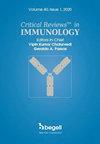基于网络药理学、机器学习和实验验证的布比益昌方对结肠癌的治疗机制研究
IF 0.9
4区 医学
Q4 IMMUNOLOGY
引用次数: 0
摘要
布比益昌方(BPYCF)具有抗癌潜力,但其对结肠癌的影响及其机制仍不清楚。本研究旨在探讨布比益肝方对结肠癌的作用及其机制。研究人员从公共数据库中获取了 BPYCF 相关靶点和结肠癌相关靶点,并对其进行了差异表达基因(DEG)鉴定。使用clusterProfiler对基因本体(GO)和京都基因组百科全书(KEGG)进行了分析。使用 STRING 数据库构建了蛋白质-蛋白质相互作用(PPI)网络。利用 CytoHubba 和 MCODE 筛选枢纽靶标。使用随机森林算法建立了诊断模型。使用 PyMOL 和 AutoDock 进行分子对接。进行了高效液相色谱-质谱(HPLC-MS)分析和体外验证。结果发现了 46 个与 BPYCF 相关的重叠靶点、与结肠癌相关的靶点和 DEGs。GO和KEGG分析表明,这些靶点主要富集在脂多糖、神经元细胞体、蛋白丝氨酸/苏氨酸/酪氨酸以及C型凝集素受体、NOD样受体和TNF信号通路中。其中,NOS3、CASP8、RIPK3 和 TNFRSF10B 与核心活性成分柚皮苷稳定对接。通过 HPLC-MS 分析,还从 BPYCF 样品中鉴定出了柚皮苷。体外实验表明,BPYCF 能抑制结肠癌细胞的活力,降低 NOS3 的表达,提高 CASP8、RIPK3 和 TNFRSF10B 的表达。BPYCF可能主要通过调节NOS3、CASP8、RIPK3和TN-FRSF10B来治疗结肠癌。该研究首次揭示了BPYCF对结肠癌的治疗作用和机制,为临床开发结肠癌靶向治疗策略铺平了道路。本文章由计算机程序翻译,如有差异,请以英文原文为准。
Study of Therapeutic Mechanisms of Bupi Yichang Formula against Colon Cancer Based on Network Pharmacology, Machine Learning, and Experimental Verification
Bupi Yichang formula (BPYCF) has shown the anti-cancer potential; however, its effects on colon cancer and the mechanisms remain unknown. This study intended to explore the effects of BPYC on colon cancer and its underlying mechanisms. BPYCF-related and colon cancer-related targets were acquired from public databases, followed by differentially expressed genes (DEG) identification. Gene Ontology (GO) and Kyoto Encyclopedia of Genes and Genomes (KEGG) analyses were performed using clusterProfiler. A protein-protein interaction (PPI) network was constructed using STRING database. CytoHubba and MCODE to screen the hub targets. A diagnostic model was built using random forest algorithm. Molecular docking was conducted using PyMOL and AutoDock. High-performance liquid chromatograph-mass spectrometry (HPLC-MS) analysis and in vitro validation were performed. Forty-six overlapping targets of BPYCF-related, colon cancer-related targets, and DEGs were obtained. GO and KEGG analyses showed that the targets were mainly enriched in response to lipopolysaccharide, neuronal cell body, protein serine/threonine/tyrosine, as well as C-type lectin receptor, NOD-like receptor, and TNF signaling pathways. Five targets were identified as the pivotal targets, among which, NOS3, CASP8, RIPK3, and TNFRSF10B were stably docked with the core active component, naringenin. Naringenin was also identified from the BPYCF sample through HPLC-MS analysis. In vitro experiments showed that BPYCF inhibited cell viability, reduced NOS3 expression, and elevated CASP8, RIPK3, and TNFRSF10B expression in colon cancer cells. BPYCF might treat colon cancer mainly by regulating NOS3, CASP8, RIPK3, and TN-FRSF10B. This study first revealed the therapeutic effects and mechanisms of BPYCF against colon cancer, paving the path for the development of targeted therapeutic strategies for this cancer in the clinic.
求助全文
通过发布文献求助,成功后即可免费获取论文全文。
去求助
来源期刊
CiteScore
2.60
自引率
0.00%
发文量
14
审稿时长
>12 weeks
期刊介绍:
Immunology covers a broad spectrum of investigations at the genes, molecular, cellular, organ and system levels to reveal defense mechanisms against pathogens as well as protection against tumors and autoimmune diseases. The great advances in immunology in recent years make this field one of the most dynamic and rapidly growing in medical sciences. Critical ReviewsTM in Immunology (CRI) seeks to present a balanced overview of contemporary adaptive and innate immune responses related to autoimmunity, tumor, microbe, transplantation, neuroimmunology, immune regulation and immunotherapy from basic to translational aspects in health and disease. The articles that appear in CRI are mostly obtained by invitations to active investigators. But the journal will also consider proposals from the scientific community. Interested investigators should send their inquiries to the editor before submitting a manuscript.

 求助内容:
求助内容: 应助结果提醒方式:
应助结果提醒方式:


